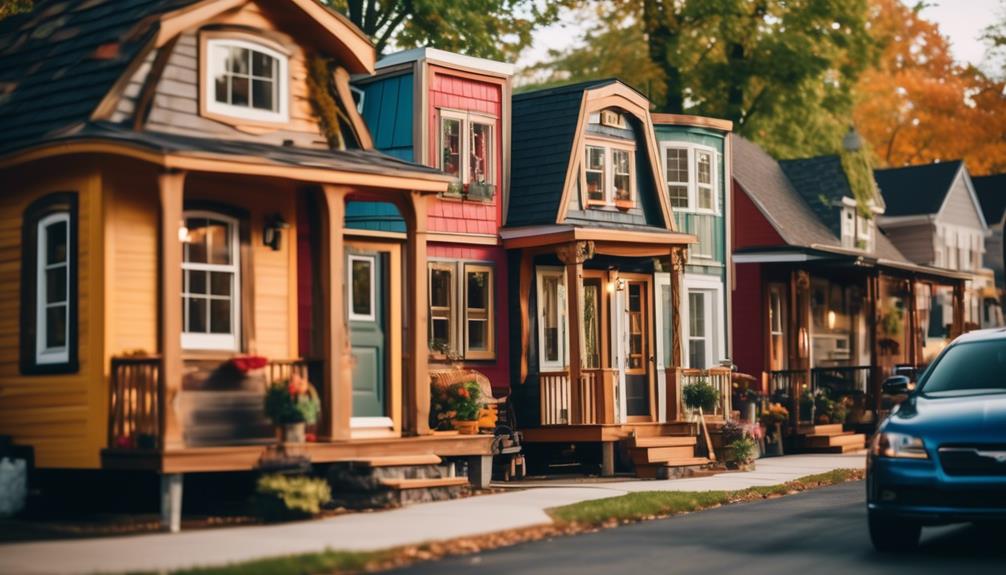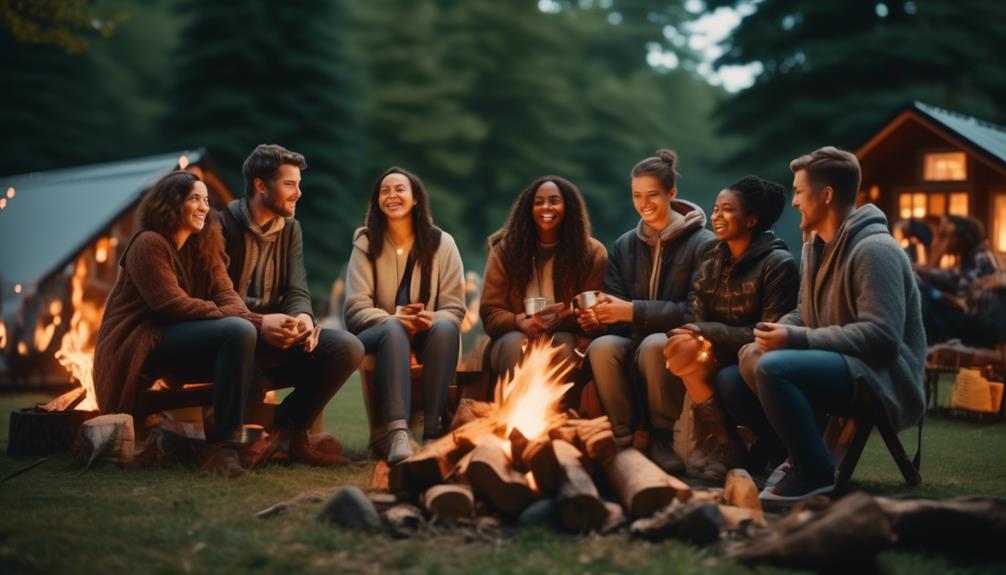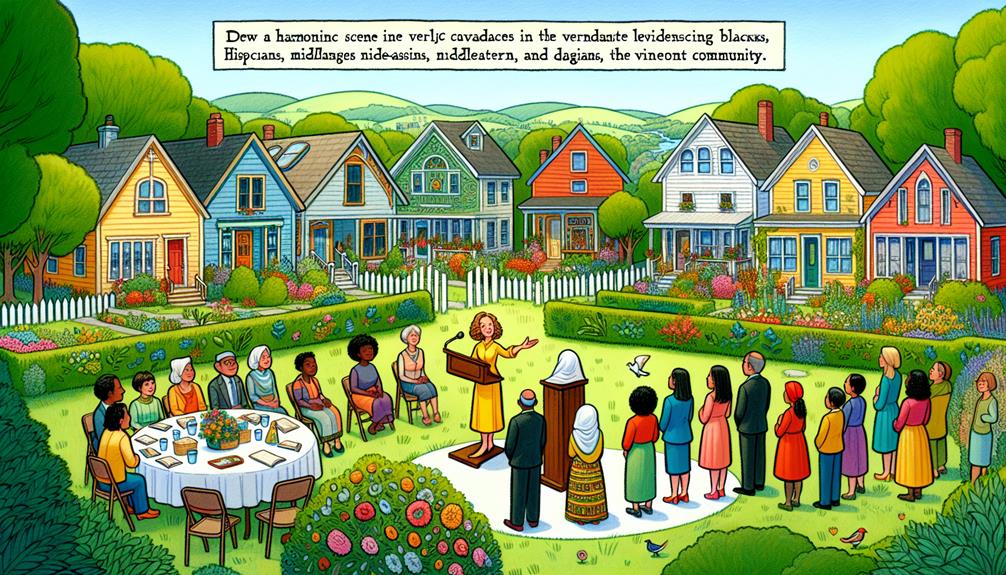The tiny house movement in Pennsylvania has gained considerable traction in recent years, as more individuals seek out affordable and sustainable housing options.
While there are no specific laws or regulations governing tiny houses in the state, it is essential to navigate the various zoning regulations that differ by municipality.
However, amidst the lack of explicit guidelines, there are pioneering individuals and organizations leading the way in this movement. These trailblazers have been instrumental in promoting tiny house living and advocating for legislative changes to accommodate this growing trend.
In this article, we will delve into the legal considerations, financing options, tiny house-friendly cities and builders, trailer dealers, social groups, and future developments in Pennsylvania, shedding light on who is at the forefront of the tiny house movement in the state.
Key Takeaways
- Pennsylvania does not have specific laws or regulations regarding tiny houses, but zoning regulations vary by municipality, so it's important to check local ordinances.
- Tiny houses on foundations are considered traditional dwellings and must comply with the Building Code and Residential Code of Pennsylvania. However, regulations differ among cities and counties.
- Tiny houses on wheels are considered recreational vehicles and must follow the regulations outlined by the 2018 Board of Vehicles Act 134. Compliance with federal vehicle regulations is necessary.
- Some cities and counties in Pennsylvania, such as Philadelphia, Harrisburg, and Pittsburgh, have specific rules and accommodations for tiny houses, while others may have restrictions on their use.
Legal Considerations for Tiny Houses in Pennsylvania
In Pennsylvania, when considering the legal aspects of tiny houses, it is important to understand the various regulations and requirements set forth by local municipalities.
While there are no specific laws or regulations regarding tiny houses in the state, zoning regulations vary by municipality, and some areas may require a minimum square footage for residential structures. It is recommended to consult with local authorities or a professional to ensure compliance.
Tiny houses on foundations are considered traditional dwellings and must comply with the regulations outlined by the Building Code and Residential Code of Pennsylvania.
On the other hand, tiny houses on wheels are classified as recreational vehicles and must comply with the federal vehicle regulations outlined by the 2018 Board of Vehicles Act 134.
Each county in Pennsylvania can amend statewide building laws to accommodate their specific needs, resulting in varying levels of tiny house friendliness and restrictions across the state.
Costs and Financing for Tiny Houses in Pennsylvania
When considering the financial aspects of tiny houses in Pennsylvania, it is important to understand the costs and financing options available. Here are three key points to consider:
- Cost range: The cost of a tiny house in Pennsylvania can range from $30,000 to $115,000. Factors such as size, materials, design, and amenities can affect the overall cost. DIY builds can be more cost-effective.
- Financing options: There are financing options available for purchasing or building a tiny house. These options include personal loans, RV loans, and construction loans. It is important to research and compare different lenders to find the best option for your needs.
- Budgeting for additional costs: In addition to the cost of the tiny house itself, it is important to budget for additional expenses such as land, utilities, and permits. These costs can vary depending on location and individual circumstances. Proper budgeting is essential to ensure a smooth transition to tiny house living in Pennsylvania.
Tiny House Friendly Cities and Builders in Pennsylvania

In Pennsylvania, several cities are known for their friendliness towards tiny houses. Philadelphia, Elizabethtown, and Harrisburg are some of the cities that have embraced the tiny house movement. These cities may have specific requirements or guidelines for tiny house living, so it is important to check their regulations.
When it comes to builders, there are several options available in Pennsylvania. Liberation Tiny Homes in Leola offers custom-made tiny homes, while Greenwood Tiny Homes in Lancaster specializes in energy-efficient designs. TinyLux Homes in Paradise is another builder that offers various creative living structures. These builders provide different design and customization options to cater to the needs and preferences of tiny homeowners in Pennsylvania.
Tiny House Trailer Dealers in Pennsylvania
Pennsylvania offers a range of options for individuals interested in tiny houses, including not only friendly cities and builders but also trailer dealers who can provide the necessary equipment for these small living structures.
When it comes to tiny house trailer options in Pennsylvania, there are several dealers to choose from:
- Brechbill Trailers in Chambersburg, PA, offers a variety of hauling products and trailer options. They have a wide selection to suit different needs and budgets.
- Smouse Trailers in Mt. Pleasant, PA, is another reputable dealer that has over 350 trailers in stock. They offer a diverse range of trailers, including utility trailers and enclosed trailers.
- AJs Truck & Trailer Center in Harrisburg, PA, provides a large selection of trailer variations, including flatbed trailers, dump trailers, and equipment trailers. They also offer trailer parts, accessories, and repair services.
Choosing a tiny house trailer has several benefits, including mobility, versatility, and the ability to customize the tiny home layout. With these trailer dealers in Pennsylvania, individuals can find the right trailer to match their unique needs and preferences.
Tiny Living Social Groups in Pennsylvania

Tiny Living Social Groups in Pennsylvania provide a platform for residents to connect, share experiences, and promote the benefits of tiny house living. These groups aim to spread awareness about tiny homes in the state and encourage community engagement and support. One prominent group is the Pennsylvania Tiny House Association, which focuses on promoting tiny house living and acceptance by homeowner associations. They have over 30,000 members in their private Facebook group, where members can share tips, ideas, pictures, and experiences. Another group is the Pennsylvania Gardening Group, which welcomes gardening lovers in Pennsylvania. Members of this group can share tips, stories, pictures, and advice about gardening, and it provides a supportive community for gardening enthusiasts. Additionally, the Philadelphia Solar Energy Association is a volunteer-based, member-supported nonprofit organization that promotes solar energy throughout Philadelphia. They host events, conferences, and campaigns to encourage the use of solar energy in the city.
| Tiny Living Social Groups in Pennsylvania | Description |
|---|---|
| Pennsylvania Tiny House Association | Promotes tiny house living and acceptance by homeowner associations |
| Pennsylvania Gardening Group | Provides a platform for gardening enthusiasts to share tips, stories, and advice |
| Philadelphia Solar Energy Association | Promotes solar energy usage through events, conferences, and campaigns |
Table: Tiny Living Social Groups in Pennsylvania and their Descriptions.
Future Developments and Initiatives in Pennsylvania
Several future developments and initiatives are underway in Pennsylvania to further support and promote the tiny house movement. Here are three key future initiatives and policy changes to look out for:
- Expansion of zoning regulations: Pennsylvania is considering revising zoning regulations to accommodate tiny houses. This includes exploring the creation of tiny house communities and designated areas for tiny house living.
- Incentives for tiny house construction: The state is exploring the possibility of providing financial incentives and tax breaks for individuals and builders who construct tiny houses. This is aimed at encouraging more people to embrace the tiny house lifestyle and promote sustainable living.
- Collaboration with builders and designers: Pennsylvania is actively seeking partnerships with builders and designers to develop innovative and affordable tiny house designs. This collaboration will focus on incorporating eco-friendly materials and energy-efficient features, ensuring that tiny houses meet high standards of sustainability.
These future initiatives and policy changes aim to create a more supportive environment for the tiny house movement in Pennsylvania, fostering innovation and sustainable living in the state.
Frequently Asked Questions
Are There Any Specific Regulations or Guidelines for Tiny Houses in Pittsburgh?
In Pittsburgh, there are specific regulations and guidelines for tiny houses. These regulations may include requirements for minimum square footage, room size, and permitted land use. It is important to consult local authorities for accurate and up-to-date information.
What Are the Average Financing Options Available for Purchasing a Tiny House in Pennsylvania?
Average financing options for purchasing a tiny house in Pennsylvania include personal loans, RV loans, and home equity loans. Requirements for these loans vary, but generally include a good credit score, proof of income, and a down payment.
Are There Any Other Cities in Pennsylvania Besides Philadelphia and Harrisburg That Are Considered Tiny House Friendly?
Elizabethtown and Pittsburgh are also considered Tiny House friendly cities in Pennsylvania. Tiny house communities offer benefits such as affordability, minimalism, and environmental sustainability. These cities provide opportunities for individuals seeking innovative and alternative housing options.
Where Can I Find Affordable Tiny House Trailers in Pennsylvania?
Affordable tiny house trailers in Pennsylvania can be found at Brechbill Trailers in Chambersburg, Smouse Trailers in Mt. Pleasant, and AJs Truck & Trailer Center in Harrisburg. Prices range from $2,000 to $23,000.
What Are Some Future Developments and Initiatives Related to the Tiny House Movement in Pennsylvania?
Future developments and initiatives related to the tiny house movement in Pennsylvania include innovative designs and sustainable building practices. Community initiatives focus on creating tiny house communities, promoting affordable housing options, and advocating for supportive regulations and zoning changes.
Conclusion
In conclusion, Pennsylvania has embraced the tiny house movement, with a growing interest in alternative and affordable housing options. While there are no specific laws or regulations regarding tiny houses in the state, it is important to navigate the various zoning regulations that vary by municipality.
Each county and city may have its own rules and restrictions for tiny houses, making it crucial for individuals to understand the specific regulations and changes in their area. Pennsylvania is leading the way in embracing the tiny house movement, paving the path for others to follow.

